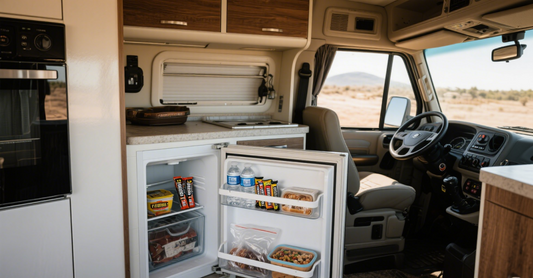Are Lithium RV Batteries Worth The Cost
As RVing continues to grow in popularity, many owners are turning to off-grid camping, or boondocking, to escape crowded campgrounds and high fees. Imagine boondocking in a remote forest, needing to power a refrigerator and lights for three days without shore power, lithium RV batteries could address such needs effectively.
In this article, we will explore the relevant factors to help you upgrade to a motorhome lifestyle and budget that suits you. By considering your power requirements, you can assess whether the long-term benefits are worth the upfront costs.


What is a Lithium RV Batteries
RV lithium batteries usually refer to rechargeable 12V batteries designed to replace traditional lead-acid batteries in recreational vehicles.
They use LiFePO4 technology, which stands for lithium iron phosphate, making them suitable for RVs equipped with solar panels or those used for boondocking.
This battery type operates efficiently in a range of conditions, providing consistent power without the need for frequent monitoring. LiFePO4 batteries stand out among battery types due to their stable chemistry, resisting thermal runaway better than alternatives like lithium NMC, ensuring safer operation for RV camping.
For RV owners new to this, understanding that LiFePO4 batteries focus on safety and stability can guide your selection process, look for models with built-in battery management systems (BMS) that monitor voltage, prevent overcharging or overheating, and maintain overall health.
This foundational knowledge helps in assessing whether a lithium deep cycle RV battery meets your specific setup, like a travel trailer needing reliable energy for lights and appliances.
Key Differences Between Lithium and Lead-Acid RV Batteries
When comparing lithium RV batteries to traditional lead-acid batteries, several technical aspects stand out that can influence your choice.
Lithium RV batteries generally offer a longer lifespan, often exceeding 10 years with proper use, while lead-acid versions typically last 3 to 5 years.
They also provide higher energy density, meaning more power in a lighter package, which is useful for RVs where weight matters.
Another difference lies in depth of discharge, lithium batteries can safely reach 100% without damage, compared to lead-acid's 50% limit to avoid shortening lifespan.
For example, a 12V 100Ah lithium battery powers a 12V fridge for twice as long as a lead-acid one, ideal for weekend boondocking.
To illustrate these contrasts clearly, consider the following table that outlines core metrics based on common models in 2025.
| Metric | Lithium RV Batteries | Lead-Acid Batteries |
|---|---|---|
| Usable Capacity (for 100Ah rating) | Up to 100Ah | Around 50Ah |
| Cycle Life | 3,000 to 5,000 cycles | 200 to 500 cycles |
| Weight (per 100Ah) | About 25-30 lbs | 60-70 lbs |
| Charging Time | 1-2 hours to full | 4-8 hours to full |
| Cost per Cycle (est. for 100Ah) | ~$0.20 | ~$0.50 |
Exploring the Benefits of Lithium RV Batteries
Lithium RV batteries bring several advantages that can enhance your camping experience, particularly for those who boondock often.
- They charge faster than lead-acid options, allowing you to replenish power quickly from solar panels or a generator, which saves time and fuel.
- Their maintenance-free design means no need to check water levels or worry about corrosion, freeing you to focus on your trip.
- In terms of energy density, these batteries store more power per pound, making them ideal for compact RVs or trailers where space is limited.
- For long-run performance, they handle deeper discharges without losing capacity over time, reducing battery anxiety during extended stays off shore power.
For a family boondocking, a lithium deep cycle RV battery could power a fridge, lights, and a fan overnight without needing a generator recharge.
Additionally, many models include features like self-heating for cold weather operation down to -4°F, ensuring reliability in varied climates, such as a Temgo 12V lithium battery.
Beyond performance, lithium batteries support sustainability, their longer lifespan means fewer replacements, reducing landfill waste by up to 80% over a decade compared to traditional lead-acid batteries.
Common Myths About Choose Lithium RV Batteries
Misconceptions can deter RV owners from considering lithium batteries, but addressing them with facts can clarify their viability.
- One myth is that they are dangerous and prone to fires, however, LiFePO4 batteries use non-combustible materials with a high thermal threshold around 518°F (~150°C), and built-in BMS adds protection.
- Another is poor performance in cold weather, yet models with heating elements function well below freezing. Many RV campers often overlook the long-term cost savings offered by lithium batteries because they subconsciously believe that they are more expensive. However, considering their durability, lithium batteries are more competitive, especially when prices are expected to drop to approximately $151 per kilowatt-hour by 2025.
Analyzing the Cost of Lithium RV Batteries: Upfront vs. Long-Term
RV battery prices for lithium models in 2025 typically average $500 to $600 for a quality 100Ah LiFePO4 battery, down from $1,000 in prior years, compared to $100 to $200 for similar lead-acid batteries.
- This upfront difference can seem steep, but evaluating long-term costs reveals potential savings.
- Lithium batteries last up to 5-10 times longer in cycles, meaning fewer replacements over a decade.
- They also charge faster and more efficiently, cutting generator runtime and fuel expenses potentially saving hundreds annually for boondockers.
- When calculating per usable kWh, lithium often comes out ahead at around $0.15 to $0.20, versus lead-acid's higher effective cost due to limited discharge.
For example, a 100Ah lithium battery at $550 provides 5,000 cycles, costing ~$0.11 per cycle, compared to a $150 lead-acid battery's ~$0.30 per cycle over 500 cycles, making lithium more cost-effective long-term.
For those converting RV to lithium batteries, factor in any needed upgrades like a compatible charger, but the investment can pay off through reduced maintenance and reliable power.
If you are considering investing in lithium RV batteries, Temgo Battery is your best battery choice. Our batteries have built-in BMS functionality and support low-temperature protection and self-heating. They can also be monitored in real time via Bluetooth to check battery health.
Lithium RV Batteries Are Worth the Cost for You
Whether lithium RV batteries are worth the cost depends on your RV usage patterns.
- For frequent boondockers, the advantages in performance and savings over time often make them a practical choice, as they support longer off-grid stays without constant recharging.
- If you stick to campgrounds with shore power, traditional lead-acid batteries might suffice without the extra expense.
In 2025, with falling prices and improved features, lithium becomes more accessible, but weigh this against your budget and trip frequency for a tailored decision.
Assess your power requirements, calculate daily usage for appliances and consider a travel trailer lithium battery upgrade if weight and space are concerns.
Use a battery calculator to estimate your needs, input devices like a 100W fridge and 20W lights to see if a 100Ah or 200Ah battery bank suits your boondocking trips.
Here's a quick checklist to guide you:
- Calculate daily power needs (e.g., 200Ah for a fridge and lights).
- Check RV charger compatibility.
- Compare long-term costs.
You can also use the Temgo RV Lithium Battery Calculator tool to provide you with a customized solution.
Conclusion
Lithium RV batteries can improve your RV experience by providing dependable power for off-grid adventures.
If you're ready to upgrade, you can choose the Temgo Batteries brand. The LiFePO4 batteries we offer feature over 4,000 cycles, built-in self-heating functionality, and an IP65 protection rating, providing long-lasting durability in RV environments.
We offer 12V deep-cycle batteries with capacities ranging from 100Ah to 460Ah, equipped with a safety battery management system (BMS) and an LCD display. These batteries are certified by CE and FCC and come with a five-year warranty.


